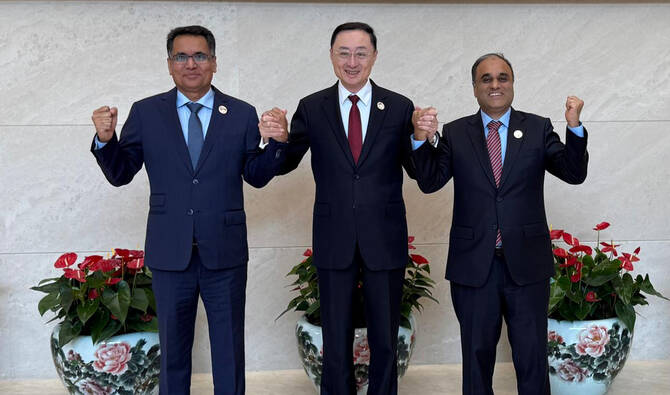ISLAMABAD: Senior officials of Pakistan, Bangladesh and China on Friday vowed to enhance trilateral cooperation in various sectors such as trade, investment, health, education, maritime affairs and others, the Chinese foreign ministry said.
Pakistan and Bangladesh are both part of China’s ambitious Belt and Road Initiative (BRI) which aims to connect Asia, Africa and Europe. China envisions the BRI to be a global network of roads, railways, ports, energy pipelines and trade corridors that strengthens Beijing’s trade ties with other regions for the benefit of its economy.
Pakistan and China are historic allies while strained ties between Islamabad and Dhaka have started to improve since the ouster of former Bangladesh PM Sheikh Hasina last year. The China-Pakistan-Bangladesh Trilateral Vice Foreign Minister/Foreign Secretary meeting was held in Kunming, Yunnan on Thursday, to discuss cooperation in various sectors between the three countries.
The meeting was attended by Chinese Vice Foreign Minister Sun Weidong, Bangladeshi Acting Foreign Secretary Ruhul Alam Siddique and Pakistani Additional Secretary (Asia Pacific) Imran Ahmed Siddiqui. Pakistan’s Foreign Secretary Amna Baloch participated in the first phase of the meeting via video link.
“The three sides agreed to explore and implement cooperation projects in such areas as industry, trade, maritime affairs, water resources, climate change, agriculture, human resources, think tanks, health, education, culture, and youth,” the Chinese foreign ministry said.
The statement said Pakistan, Bangladesh and China will establish a working group to follow up and implement the understandings reached during the meeting on Thursday. The three sides emphasized that China-Bangladesh-Pakistan cooperation adheres to true multilateralism and open regionalism, not directed at any third party, it added.
Pakistan’s foreign office said Baloch conveyed Islamabad’s readiness to work with China and Bangladesh to enhance ties in trade and investment, agriculture, digital economy, environment protection, marine sciences, green infrastructure, culture, education and people-to-people exchanges.
“The three sides agreed that trilateral cooperation would be guided by the principles of openness, inclusivity, good neighborliness, mutual respect and trust, while working toward win-win cooperation,” Pakistan’s foreign office said.
Pakistan has recently eyed closer cooperation in trade and investment with regional allies as it grapples with a macroeconomic crisis that has drained its financial resources, significantly weakened its currency and triggered a balance of payments crisis for the South Asian country.
Prime Minister Shehbaz Sharif has repeatedly spoken about his government’s intention to enter “mutually beneficial” partnerships with allies as opposed to seeking loans from them.
In recent months Pakistan has signed memoranda of understanding with allies such as Saudi Arabia, China, United Arab Emirates, Azerbaijan, Turkiye and others worth billions of dollars.
















